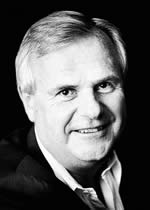

 |
|
| Paul Myners Chairman |
|
The Group has continued to make good progress in pursuit of our ambitious and distinct goals.
On a total turnover of £440 million, pre-tax profits fell from last year's record £73.5 million to £67.3 million. Increased spending on the Group's new media initiatives is reflected in a reduction in total operating profit which fell from £47.4 million to £29.4 million. New media investment expensed through the profit and loss account involved a net cost of over £34 million in the year compared with £7 million in the previous year. Net cash inflow from continuing operations, at £20 million, was below that of the last three years, as a consequence of our commitment to sustained development spending. However, our net cash position continued to strengthen to £194 million from £176 million in the previous year. At 1st April 2001 the Group had net assets of £328 million.
Successful organisations do not stand still. In the global communications environment, quality and competitiveness are increasingly the partners of progress in a sector which is undergoing a period of intense challenge and change.
Last year I drew attention to the role of the Scott Trust, which owns GMG. The Trust enables us to operate free from short-term concerns, placing priority on our primary mission: securing the future of the Guardian and Observer. The value of the Trust has always been apparent, both through its staunch defence of our independence and its instinctive support of our editorial values. But a companion strength is its ability to take the long strategic view and, with the Board, thus support the executive in its continuing aim to provide the soundest financial base for our main titles.
GMG owns an actively managed portfolio of media businesses, supported by our core organisational competencies. We recognise that our key challenge is to apply our skills in a commercially competitive way while respecting and drawing strength from the values of the Trust. These principles relate as keenly to our new media and radio activities, which have grown rapidly in the last year, as to established parts of the business. The value of our forward-looking approach can be judged by the broad progress which has been made by our new ventures at a time when the experience at other media groups has been markedly less happy.
I indicated last year that a developing asset of our trusted brands - the Guardian, Observer and Manchester Evening News - was their ability to extend successfully into new media, particularly at a time when traditional advertising revenues were coming under pressure. The continuing progress of the Guardian has been echoed by its website, Guardian Unlimited, emphasising that inherent journalistic talent allied to technological innovation can be a powerful combination when set within a carefully judged business plan.
Our vision of high journalistic standards characterising a core product which we intend to deliver in an increasing variety of ways, matches today's more technologically versatile and mobile consumers. While that approach may be in tune with 21st Century media markets, its origins can be traced back nearly 150 years when the Guardian - then merely a weekly - decided to publish six days a week, giving itself, in the current idiom, a larger platform on which to develop its consumer base.
The Chief Executive's report contains a detailed perspective of the Group's range of activities, and I would like to draw attention to the continuing circulation successes of the Guardian and Observer based on heavy investment in product development and marketing; the success of our radio operations; and the strength of our regional newspapers and the newly created Trader Media Group. In addition, in this year's report there is a more detailed record of the growing effort being made by companies across the organisation to support community initiatives, both at local and national levels, focusing on young people in particular. Whilst each company has developed its own programme of community involvement, there is also an impressive record of voluntary work undertaken by individuals.
Last November marked the retirement of the Managing Director of Guardian Newspapers Limited (GNL), Caroline Marland. She joined the company in 1976 and in a career of remarkable progress worked her way through GNL to join the Board in 1995. Caroline's sharp mind and sense of style were distinctive features at the Board and within the Guardian, where her leadership skills made a profound impact. I and my colleagues wish her well in what we know will be anything but a quiet retirement. I hope the story of her successful career will encourage others to see the Group as a provider of opportunity for those with talent and a wish to aspire to the highest professional standards.Following Caroline's retirement, we welcome Carolyn McCall to the GMG Board as her successor. Carolyn was appointed in October 2000. She is already making a confident and significant contribution to our deliberations.
The financial year end also coincided with the retirement of Arthur Townsend, the Company Secretary and Deputy Financial Director. Arthur had worked for the Manchester Evening News and GMG for 32 years, during which time he contributed significantly to the growth and development of the organisation. We wish him a long, happy and active retirement. Arthur is succeeded by Phil Boardman, who joins us from Hickson International PLC.
We owe much to the dedication of our people. Although there are fewer certainties in present-day life, the commitment to high standards of those who work within GMG ensure that there is a consistent and enduring value to what we do. We do not do it simply for profit. We do it for the privilege of serving the public interest.
